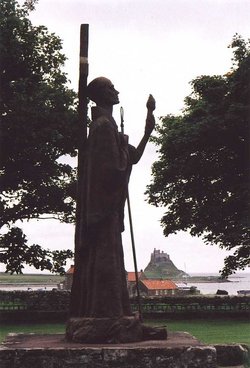Aidan of Lindisfarne
Our father among the saints Aidan of Lindisfarne, Enlightener of Northumbria (?-651), was the founder and first bishop of the monastery on the island of Lindisfarne off the northeast coast of England. A Christian missionary, he is credited with restoring Christianity to Northumbria (Northern England). His feast day is August 31.
Life
An Irishman, possibly born in Connaught, Aidan was a monk at the monastery on the island of Iona in Scotland.
The Roman Empire had spread Christianity into England, but due to its decline, paganism was seeing a resurgence in Northern England. St. Oswald of Northumbria had been living at the Iona monastery as a king in exile since 616 A.D. There he converted to Christianity and was baptized. In 634 he gained the crown of Northumbria, and was determined to bring Christianity to the mostly pagan people there.
Due to his past at Iona, he requested missionaries from that monastery instead of the Roman-backed monasteries in England. At first the monastery sent a new bishop named Corman, but he returned to Iona and reported that the Northumbrians were too stubborn to be converted. Aidan criticised Corman's methods, and was soon sent as a replacement in 635.
Aidan chose the island of Lindisfarne, close to the royal castle at Bamburgh, as his diocese. King Oswald, who spoke Irish Gaelic, often had to translate for Aidan and his monks, who did not speak English at first. When Oswald died in 642, he received continued support from King St. Oswin of Deira, and the two became close friends.

An inspired missionary, St. Aidan would walk from one village to another, politely conversing with the people he saw, slowly interesting them in Christianity. According to legend, the king gave Aidan a horse so that he wouldn't have to walk, but Aidan gave the horse to a beggar. By patiently talking to the people on their own level, Aidan and his monks slowly restored Christianity to the Northumbrian communities. Aidan also took in twelve English boys to train at the monastery, to ensure that the area's future religious leadership would be English.
In 651 a pagan army attacked Bamburgh and attempted to set its walls ablaze. According to legend, Aidan prayed for the city, after which the winds turned and blew the smoke and fire toward the enemy, repulsing them.
Aidan's friend St. Oswin of Deira was murdered in 651. Twelve days later Aidan died, on August 31, in the 17th year of his episcopacy. He had become ill while at the Bamburgh castle, and died leaning against the wall of the local church.
St. Aidan's expression of the Orthodox Christian faith was more from the native Celtic strand rather than the Roman/Latin variety growing in the south of England, but his character and energy in missionary work won him the respect of Popes Honorius I and Felix I.
The monastery he founded grew and helped found churches and other monasteries throughout the area. It also became a center of learning and a storehouse of scholarly knowledge. The Venerable Bede would later write Aidan's hagiography and describe the miracles attributed to him.
See also
External links
Categories > Church History
Categories > Church History
Categories > Church History
Categories > Church History
Categories > Church History
Categories > Liturgics > Feasts
Categories > Liturgics > Feasts
Categories > Liturgics > Feasts
Categories > Liturgics > Feasts
Categories > Liturgics > Feasts
Categories > People > Clergy > Bishops
Categories > People > Clergy > Bishops > Bishops by century > 7th-century bishops
Categories > People > Missionaries
Categories > People > Monastics
Categories > People > Saints
Categories > People > Saints > Pre-Schism Western Saints
Categories > People > Saints > Saints by century > 7th-century saints
Categories > People > Saints > Saints of the British Isles
Categories > People > Saints > Wonderworkers
